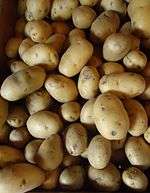Potato paradox
The potato paradox is a mathematical calculation that has a counter-intuitive result. The Universal Book of Mathematics states the problem as follows:
Fred brings home 100 kg of potatoes, which (being purely mathematical potatoes) consist of 99% water. He then leaves them outside overnight so that they consist of 98% water. What is their new weight? The surprising answer is 50 kg.[3]
In Quine's classification of paradoxes, the potato paradox is a veridical paradox.
Simple explanations
Method 1
One explanation begins by saying that initially the non-water weight is 1 kg, which is 1% of 100 kg. Then one asks: 1 kg is 2% of how many kg? In order for that percentage to be twice as big, the total weight must be half as big.
Method 2

In the beginning (left figure), there is 1 part of non-water and 99 parts of water. This is 99% water, or a non-water to water ratio of 1:99. To double the ratio of non-water to water to 1:49, while keeping the one part of non-water, the amount of water must be reduced to 49 parts (middle figure). This is equivalent to 2 part of non-water to 98 parts water (98% water) (right figure).
In 100 kg of potatoes, 99% water (by weight) means that there is 99 kg of water, and 1 kg of solids. This is a 1:99 ratio.
If the percentage decreases to 98%, then the solids must now account for 2% of the weight: a ratio of 2:98, or 1:49. Since the solids still weigh 1 kg, the water must weigh 49 kg to produce a total of 50 kg.
Explanations using algebra
Method 1
After the evaporating of the water, the remaining total quantity, , contains 1 kg pure potatoes and (98/100)x water. The equation becomes:
resulting in = 50 kg.
Method 2
The weight of water in the fresh potatoes is .
If is the weight of water lost from the potatoes when they dehydrate then is the weight of water in the dehydrated potatoes. Therefore:
Expanding brackets and simplifying
Subtracting the smaller term from each side
Which gives the lost water as:
And the dehydrated weight of the potatoes as:
Method 3
After the potatoes are dehydrated, the potatoes are 98% water.
This implies that the percentage of non-water weight of the potatoes is .
If x is the weight of the potatoes after dehydration, then:
Implication
The answer is the same as long as the concentration of the non-water part is doubled. For example, if the potatoes were originally 99.999% water, reducing the percentage to 99.998% still requires halving the weight.
The Language Paradox
We imagine, from the initial query, that we are reducing weight by 1%. This is not the case. If it were, we would be right that we would then have 99 kg of potatoes (99.01 kg if you reduce 1% of the 99 kg of water; 99 kg if you reduce the total weight by 1% by removing 1kg of water – how it is worded makes all the difference!). But reducing water so that it is then 98% of the whole new weight of the potatoes means that we are eliminating half (actually a bit over half – 50/99) of the water so that the potato solids are then 2% of the total weight. The paradox, then, is not in the math, but in our understanding of the language used to define the question. Careful wording must be used to ensure that the "paradox" is correct.
References
- "Water Content of Fruits and Vegetables, Cooperative Extension Service, University of Kentucky" (PDF). Retrieved 11 January 2016.
- "Agar production methods – Food grade agar, UN Food and Agriculture Organization". Retrieved 11 January 2016.
- "potato paradox". Encyclopedia of Science. Archived from the original on 2 February 2014.
